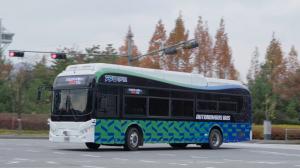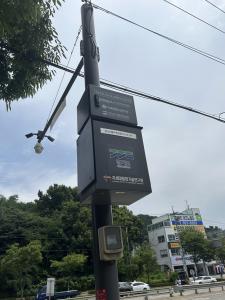
PanTA-G Bus, Gyeonggi-do’s self-driving bus

Self-driving demonstration sensor in Pangyo Techno Valley

Mando NextM
PANGYO, SOUTH KOREA, July 20, 2023/EINPresswire.com/ — Gyeonggi-do is set to commence the pilot operation of its domestic public transportation service, the ‘PanTA-G Bus,’ which is equipped with autonomous driving technology, at Pangyo Techno Valley.
Following the successful operation of the Zero Shuttle in 2018, the PanTA-G Bus, a cooperative autonomous vehicle, has embarked on its journey through Pangyo Zero City. The “G” in the bus’s name, “Fanta G,” is an homage to Gyeonggi-do Bus. The vehicle is equipped with technology capable of deciphering road information, including traffic signals, traffic conditions, and pedestrians. It also possesses the ability to detect potential threats on its own.
Measuring 10.99m in length, 2.49m in width, and 3.39m in height, the PanTA-G Bus is a modification of Edison Motors’ low-floor electric bus, reengineered as a cooperative autonomous vehicle (COV). With a maximum speed of 40 km, the bus can execute a safe halt even in emergent collision situations. The system halts if the driver intervenes with the operation of the accelerator or brake pedal, providing a safety measure during emergencies.
The realization of this autonomous technology was facilitated by the support of the Gyeonggi-do government, numerous tech companies, and local governments associated with Pangyo Techno Valley.
In 2016, significant stakeholders including the Ministry of Land, Infrastructure and Transport, Korea Land and Geospatial Informatix Corporation, KT Network, and the Head of the BMW Group Korea R&D Center convened at the Gyeonggi Center for Creative Economy Innovation in Pangyo. They reached a collaborative agreement to establish a “Self-Driving Demonstration Complex” and position Pangyo Zero City as a self-driving pilot city.
Under this initiative, the Ministry of Land, Infrastructure, and Transport recognized Pangyo Zero City as a pilot operation complex dedicated to autonomous vehicles. This recognition includes providing critical infrastructure like high-precision road maps, GPS, and next-gen Intelligent Transportation Systems (C-ITS).
In April of last year, Continental, a leading global automotive company, partnered with Gyeonggi-do to erect a two-story (2,809㎡) future car research center within the Global R&D Center building. This center is spearheading the development of autonomous driving software including 5G communication parts for vehicles, passenger monitoring systems, and safety components such as airbags.
Moreover, Atech Automotive, a subsidiary of Chery Automobile – one of China’s top five automakers – operates an R&D facility dedicated to autonomous driving technology in Pangyo Zero City. The company leverages services such as autonomous vehicle charging, communication facilities, and electronic maps in Gyeonggi-do.
Yura Corporation’s R&D center, which focuses on the development of essential components for autonomous vehicles, and Mando, an automotive parts manufacturer under the Halla Group, have committed an investment of 93.4 billion won to construct a research center specializing in autonomous vehicles in Pangyo. HL Klemove, an autonomous solution provider of the HL Group, opened Next M, a building with a total area of approximately 30,000 square meters, in the 2nd Techno Valley in Pangyo in 2022. Additionally, various companies, from conglomerates to startups – including Aimmo, a startup specializing in the development of AI data management solutions for autonomous driving – are flocking to Pangyo Techno Valley, fostering collaboration in the development of autonomous driving technology.
Kim Hyun-dae, the Director of Future Growth Industry for Gyeonggi-do Government, commented, “The pilot operation of the PanTA-G Bus signifies a pivotal moment as autonomous driving technology is being earnestly adopted in public transportation services. The future car industry is one of the three key strategic sectors for Gyeonggi-do, and we are committed to contributing to the expansion of autonomous driving. This demonstration of the PanTA-G Bus will also help invigorate other related industries.”
A total of two PanTA-G Buses operate 24 times a day at 30-minute intervals, from 7:30 am to 7:00 pm on weekdays (based on departure time). During the trial period, the service is available free of charge to all users. However, for safety reasons, children under the age of 6 are not allowed to board.
Vallabh Rao
TopPRWire
email us here
![]()









































